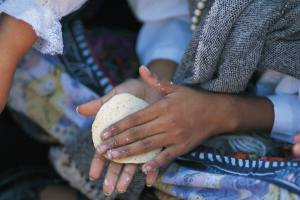 only we had died by the Lord’s hand in Egypt! There we sat around pots of meat and ate all the food we wanted, but you have brought us out into this desert to starve this entire assembly to death.”
only we had died by the Lord’s hand in Egypt! There we sat around pots of meat and ate all the food we wanted, but you have brought us out into this desert to starve this entire assembly to death.”Then the Lord said to Moses, “I will rain down bread from heaven for you. The people are to go out each day and gather enough for that day. In this way I will test them and see whether they will follow my instructions. On the sixth day they are to prepare what they bring in, and that is to be twice as much as they gather on the other days.” Exodus 16:1-5 NIV
For those who work with victims of human trafficking, domestic violence or abuse victims, there is an unhappy truth: not everyone who finds their way to freedom from the abuse remains free.
Some return to their abusive situations because they fear they cannot make it on their own.
Maybe they fear retribution or harm to their children unless they return to their abusers. Often they lack the self-confidence necessary to make it on their own because of the years of brutalization. And sometimes they lack the support from outside agencies, family or their communities to pick up the pieces of their broken hearts and lives. Some may even feel overwhelming guilt and shame if the abuser threatens to harm himself unless they return. Many are looked down upon as the "bad” ones, even though they were victimized and not the ones responsible for the abuse.
Dealing with all this fear, confusion, lack of self esteem, shame and guilt isn’t easy. Those emotions often play into one’s ability to cope with freedom, causing disorientation and an inability to make wise decisions. Freedom from the abuse can be too hard, too frightening, so they return to the only life they know.
Look at the children of Israel. They were brutalized for generations as slaves. No doubt they suffered from this type of fear and disorientation after their deliverance from Egypt.
In spite of all the mighty miracles they had seen and experienced so far on the journey, they were still afraid to trust God. It was easier to look back to the things they knew, and to edit out the bad parts, than it was to trust God and look to the future: “There we sat around pots of meat and ate all the food we wanted, but you have brought us out into this desert to starve this entire assembly to death.”
The Lord understood how fragile the faith of the Israelites was at this point. They had forgotten who God was and his promises to their forefather, Abraham, about becoming a mighty nation. They saw his acts but still didn’t know his nature as he washed their enemies away in the Red Sea and then sweetened the water at Marah. They were unsure about trusting him with their lives. This new freedom frightened them and seems too hard.
Thankfully, God had a plan for healing their fear and building their trust.
- He made it impossible for them to return to their life of slavery, destroying the enemy that had enslaved them and putting the Red Sea between them and their past life.
- Then he put them into a situation where they had to trust their lives entirely to him in the wilderness. By now their unleavened bread had run out that they had baked in Egypt. They had no grain to bake new bread and no way to get enough grain to bake more for so many people. Sure they had flocks of sheep and goats, but if they used them all for food now, what would they do when they got to their new home? How would they start over?
- In his wisdom, God sent them two ongoing miracles of provision - Manna each morning - a heavenly substance to be used like grain to give them strength for each day; and flocks of quail in the evening to satisfy their hunger for meat for their pots because they craved it.
- God wanted them to learn that trust didn't have to mean enslavement. Unlike Pharaoh, God did not plan to enslave them, beat them and destroy them after providing for them. He provided because they were his children and he cared for them as a nation. His provision was meant to teach them to trust again and to help them become whole. It was "safe" to trust his provision.

Can you think of any times in your life where God has done this to you? I'd love to hear about your experiences!
Blessings!
Bonnie
No comments:
Post a Comment